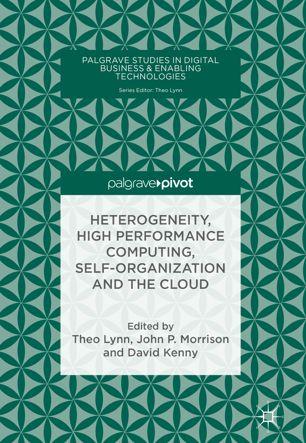https://ebookmass.com/product/engineering-of-highperformance-textiles-1st-edition-menghe-miao/
Instant digital products (PDF, ePub, MOBI) ready for you
Download now and discover formats that fit your needs...
Armstrong’s Handbook of Performance Management: An Evidence Based Guide to Delivering High Performance (Ebook PDF)
https://ebookmass.com/product/armstrongs-handbook-of-performancemanagement-an-evidence-based-guide-to-delivering-high-performanceebook-pdf/ ebookmass.com
Active Coatings for Smart Textiles 1st Edition Hu
https://ebookmass.com/product/active-coatings-for-smart-textiles-1stedition-hu/
ebookmass.com
Heterogeneity, High Performance Computing, SelfOrganization and the Cloud 1st ed. Edition Theo Lynn
https://ebookmass.com/product/heterogeneity-high-performancecomputing-self-organization-and-the-cloud-1st-ed-edition-theo-lynn/ ebookmass.com
Without Destroying Ourselves: A Century of Native Intellectual Activism for Higher Education John A. Goodwin
https://ebookmass.com/product/without-destroying-ourselves-a-centuryof-native-intellectual-activism-for-higher-education-john-a-goodwin/ ebookmass.com
WoodheadPublishingisanimprintofElsevier
TheOfficers’MessBusinessCentre,RoystonRoad,Duxford,CB224QH,UnitedKingdom 50HampshireStreet,5thFloor,Cambridge,MA02139,UnitedStates TheBoulevard,LangfordLane,Kidlington,OX51GB,UnitedKingdom © 2018ElsevierLtd.Allrightsreserved.
Nopartofthispublicationmaybereproducedortransmittedinanyformorbyanymeans,electronicor mechanical,includingphotocopying,recording,oranyinformationstorageandretrievalsystem,without permissioninwritingfromthepublisher.Detailsonhowtoseekpermission,furtherinformationaboutthe Publisher’spermissionspoliciesandourarrangementswithorganizationssuchastheCopyrightClearance CenterandtheCopyrightLicensingAgency,canbefoundatourwebsite: www.elsevier.com/permissions
Thisbookandtheindividualcontributionscontainedinitareprotectedundercopyrightbythe Publisher(otherthanasmaybenotedherein).
Notices
Knowledgeandbestpracticeinthisfieldareconstantlychanging.Asnewresearchandexperience broadenourunderstanding,changesinresearchmethods,professionalpractices,ormedicaltreatment maybecomenecessary.
Practitionersandresearchersmustalwaysrelyontheirownexperienceandknowledgeinevaluating andusinganyinformation,methods,compounds,orexperimentsdescribedherein.Inusingsuch informationormethodstheyshouldbemindfuloftheirownsafetyandthesafetyofothers,includingparties forwhomtheyhaveaprofessionalresponsibility.
Tothefullestextentofthelaw,neitherthePublishernortheauthors,contributors,oreditors,assume anyliabilityforanyinjuryand/ordamagetopersonsorpropertyasamatterofproductsliability,negligence orotherwise,orfromanyuseoroperationofanymethods,products,instructions,orideascontained inthematerialherein.
LibraryofCongressCataloging-in-PublicationData
AcatalogrecordforthisbookisavailablefromtheLibraryofCongress BritishLibraryCataloguing-in-PublicationData
AcataloguerecordforthisbookisavailablefromtheBritishLibrary
ISBN:978-0-08-101273-4(print)
ISBN:978-0-08-101885-9(online)
ForinformationonallWoodheadpublicationsvisitour websiteat https://www.elsevier.com/books-and-journals
Publisher: MathewDeans
AcquisitionEditor: DavidJackson
EditorialProjectManager: EdwardPayne
ProductionProjectManager: SuryaNarayananJayachandran
CoverDesigner: VictoriaPearson
TypesetbySPiGlobal,India
PartThreeProductspecialization277
12Compressionandstretchfitgarments279 A.Yu,K.L.Yick
13Conductivetextiles305
K.(Kelvin)Fu,R.Padbury,O.Toprakci,M.Dirican,X.Zhang
14Insect-repellenttextiles335
J.H.Xin,X.W.Wang
15Camouflagefabrics349
B.Ozgen EgeUniversity,Izmir,Turkey
R.Padbury NorthCarolinaStateUniversity,Raleigh,NC,UnitedStates
X.Qian TianjinPolytechnicUniversity,Tianjin,China
O.Toprakci NorthCarolinaStateUniversity,Raleigh,NC,UnitedStates
F.Wang TheHongKongPolytechnicUniversity,Kowloon,HongKong
L.Wang TianjinPolytechnicUniversity,Tianjin,China;RMITUniversity, Brunswick,VIC,Australia
X.W.Wang TheHongKongPolytechnicUniversity,Kowloon,HongKong
J.H.Xin TheHongKongPolytechnicUniversity,Kowloon,HongKong
S.Yang CSIROManufacturing,Geelong,VIC,Australia
K.L.Yick TheHongKongPolytechnicUniversity,HungHom,HongKong
A.Yu TheHongKongPolytechnicUniversity,HungHom,HongKong
X.Zhang NorthCarolinaStateUniversity,Raleigh,NC,UnitedStates
Chapter15 reviewsthedevelopmentofcamouflagefabricsusedbythemilitary, hunters,gamewatchers,andthelike.Thischapterexploresthecurrentstateofcommercialdetectionsystemsandthecamouflagefabricsusedtodefeatthesesystems. Chapter16 dealswithfabricsdesignedfordefeatingballisticandstabthreatsfacing themilitaryandlawenforcementpersonnel.Itreviewstheprinciplesofdynamics behindbodyarmordesignandrecentdevelopmentsinballisticfibersandfabric structures.
Chapter17 beginswithanoverviewoftheperformancerequirementsofvarious filterfabricsandthetheoriesofdepthfiltration,surfacefiltration,andbloodfiltration. Itgoesontodiscusstheengineeringofwovenandnonwovenfilterfabricstoachieve optimumperformance. Chapter18 reviewsthefabricsdesignedforthereinforcement ofengineeringcomposites,especiallycarbonfiber-reinforcedpolymermatrixcomposites.Thechapterpresentswiderangesof2Dand3Dfabricpreformstructures,their characteristics,andmanufacturingtechnology.
Finally,weacknowledgethetimeandeffortsofourcontributors,whoareexperts intherespectiveareasdescribedinthisbook.
MengheMenghe
JohnH.Xin
TheHongKongPolytechnicUniversity May2017
4EngineeringofHigh-PerformanceTextiles
Fig.1.1 Worldfiberdemandtrend.(A)Totalfiberdemand;(B)Globalfiberdemandpercapita (http://www.textileworld.com/textile-world/fiber-world/2015/02/man-made-fibers-continueto-grow/,accessed08.07.16).
Synthetic (noncellulosic) fibers
Fig.1.2 Compositionofworldapparelfiberconsumptionbyfibertype(FAO-ICAC,2013).
Withrapidprogressinpolymerscienceandfiberengineeringtechnologyoverthe lastthreetofourdecades,manynewMMFwithcharacteristicsthatsurpassnatural fibershaveemerged.ThesenewspecialtyfibersarecoveredinChapter2.
1.1.2Yarnproductionsystems
Historically,differentprocessing(spinning)systemsweredevelopedforcotton,wool, andtoalesserextent,forlinen(mainlyflax)andsilk.Amajordistinctionbetween themistheirabilitytodealwithdifferentfiberlengths.Woolcanbeprocessedon eithertheworstedorwoolensystems.Generallyspeaking,longwoolisprocessed ontheworstedsystem,whichinvolvescombing,repeatedgilling(pin-drawing) andhigh-draftspinning.Woolblendscontainingshorterfiberswithawidelengthdistributionareprocessedonthewoolensystem.Inthewoolensystem,fibersarefirst processedonacondensercardfollowedbylow-draftspinning.Cottonspinninghas alotofsimilaritieswithworstedspinning,butflat-cardingandrollerdrawing,instead ofroller-cardingandpin-drawing,areusedbecausecottonisconsiderablyshorterthan thewoolusedinworstedspinning.Therearedistinctdifferencesincharacteristicsof theyarnsprocessedbythesespinningsystems.
Cotton Wool Flax
Cellulosic fibers
Electrospinningisamethodforproducingsubmicronfibersfromavarietyofmaterials,forexample,polymersandcomposites.Inthepresenceofastrongelectricfield, anelectrostaticchargeisintroducedtoafinestreamofpolymersolutiondirectedata groundedcollectorplate.Theelectricallychargedjetofpolymersolutionaccelerates andthinsoutintheelectricfield.Ifasolventispresentitusuallyevaporatesbeforethe filamentreachesthecollectorplate.Mostelectrospunfibersareinthesubmicron diameterrange(100–500 μm)(Teoetal.,2016).Thepotentialapplicationsof electrospunfibersincludefiltration,cellgrowthscaffolding,energystorage,etc.
Nanofibers(<100 μm)havebeenthesubjectofintensiveresearchsincethe early1990s.Severalmethodsofmanufacturingnanofibershavebeeninvestigated (Pisignano,2013).Animportantfiberunderthiscategoryisthecarbonnanotube.Carbonnanotubesarethermallyandelectricallyconductive,andarethestrongestand stiffestmaterialsyetdiscoveredintermsoftensilestrengthandelasticmodulus (Yuetal.,2000).Thisstrengthresultsfromthecovalent sp 2 bondsformedbetween theindividualcarbonatoms.Carbonnanotubescanbemadeintononwovensheets (knownasbuckypapers)andmicrosizedyarns(Miao,2013).Awiderangeofpotential applicationshavebeeninvestigated,includingstrongtextileandcompositematerials, energystoragedevices,sensors,artificialmuscles,etc.
1.2.2Fiberfinenessandyarncountlimit
Withoutconsideringfibercurlingandyarnlengthcontractioncausedbytwistinsertion,thelineardensityofayarnisthesumofthelineardensitiesofallitsconstituent fibersintheyarncrosssection,whichisequaltothemeanfiberlineardensity multipliedbythenumberoffibersintheyarncrosssection.Modernstapleyarn manufacturingmachinerydoesnotarrangefibersendtoendintheresultingyarn. Thespinnercanonlycontroltheaveragenumberofalignedstaplefibers(n)inthe yarncrosssection,butnottheexactnumberoffibersinanyparticularcrosssection oftheyarn.Inanidealscenario,thenumberoffibersintheyarncrosssectionis randomwithastandarddeviationequaltothesquarerootoftheaveragefiber number(√ n)(Martindale,1945).Theirregularity(coefficientofvariation)ofthe yarnisreciprocalofthestandarddeviationoffibernumber(1=√ n).Yarnirregularity isaveryimportantqualityindicator.Tokeeptheyarnirregularityundercontrol,the averagenumberoffibersintheyarncrosssectionmustbesufficientlylarge(n > nmin). Therefore,thefinestyarnthatcanbespunisdirectlyrelatedtothemeanlineardensity ofthefiberused.Intheworstedindustry, nmin isgenerallyconsideredtobeabout 35–40,dependingonthemanufacturer’stoleranceofyarnirregularity.
Themassirregularityofacommercialyarnisalwaysgreaterthantheideal valuepredictedfromtheaveragefibernumber.Thisisbecause,first,theprocessing machineryisnotperfectandsecond,thefibersdonothaveidenticallineardensity. Vastamountsofcommercialdataarecollectedeachyearonyarnirregularityasa functionofyarnlineardensityandthedataarepublishedinUsterStatistics (https://www.uster.com/en/service/uster-statistics/).
1.2.3Woolaccordingtodiameter
Woolconstitutesabout2%oftheworldapparelfiberproduction.Wool’slimited supplycoupledwithitsexcellenttextileperformancepropertieshaveresultedinwool productsbeingpositionedattheluxuryendofmostmarkets.Owingtotherangeof sheepbreedsandwooltypesproduced,woolisprocessedintoawiderangeofend products.Endusesaredeterminedbythemainfibercharacteristics,withfiberdiameterbeingthemostimportantparameter. Fig.1.4 showstheapproximaterangeof applicationsfordifferentwoolsaccordingtofiberdiameter.
Animportantconsiderationofwoolselectionfornext-to-skingarmentsiswhether thefiberscauseapricklesensationthatarisesfromthemechanicalstimulationof specificnerveendings(Garnsworthyetal.,1988).Fiberscoarserthanabout30 μm arestiffenoughtoupholdaforcelargeenoughtotriggerthispricklesensation (Naylor,1992).Woolfibershaveanaturalspreadofdiametersandthepercentage offibersgreaterthan30 μmisoftenreferredtoas“pricklefactor”ofthewool.In theory,thepricklefactorcanbeachievedbyeitherreducingthecoarseedgeofthe diameterdistributionorbyreducingthemeanfiberdiameter.Inpractice,reducing thecoarseedgeofwooldiameterdistributionisdifficulttoachieveandchanging toafinerwoolisalwaysthechoicetoeliminatefabric-evokedprickle.
AnotheranimalhairfiberthatdeservesspecialmentionisCashmeredownfiber. Cashmerecommandssomeofthehighestpricesintheworldoftextiles.Cashmere hasafiberdiameterbetween12.5and16.0 μm.Worldproductionofcleancashmere isestimatedatabout6500tones( https://en.wikipedia.org/wiki/Cashmere_wool). Theappealofcashmereanditsunrivalle dstatusasaluxuryfiberisrootedfrom itsvisualappealandextremesoftness,scarcity,anditsmystique.Cashmereiscommonlyspunintowoolenyarns,whichare usedinknitwear.Manyknitwearproducersusecashmerebutbecauseofitscostoftenuseitinblendswithother fibersincludingMMF.Cashmereisalsousedinwovenaccessories(scarves,shawls, Carpets
andstoles),rugs(especiallytravelrugs and“throws”)andclothforluxurycoats, jackets,andsuitsforthemensweartrade.
1.3Fiberlength
Fabricsmadefromcontinuousfilamentyarnsgiveabrightandsmoothappearance. Filamentyarnswithverylowornotwist(flatfilamentyarn)retainalmostallthe strengthoftheindividualfilaments.Fabricsmadefromsuchyarnsareespeciallysuitableforapplicationsthatrequiremaximumstrengthandmodulus,suchasengineering compositesandbodyarmors.
Thebulkofappareltextilesaremadefromstaplefibers,althoughtheuseoffilamentpolyesteryarnisincreasing.Thesurfaceroughness,hairiness,porosity(bulk)of staplefiberyarnsgivedullappearance,“natural”texture,softhandle,andwarmthto thefinalfabrics.Fiberlengthanditsdistributioninfluencethechoiceofyarn manufacturingmethodandfurtherprocessingtechnologyandaffectthestructure andpropertiesofthespunyarn.
1.3.1Fiberlengthmeasurement
Therearemanywaystoexpressfiberlength.Staplelengthisthecharacteristicfiber lengthestimatedbysubjectivevisualassessmentofafibertuftpreparedbyhand.The word“staple”originatedfromthewoolindustry,whereawoolstapleisanaturally formedlockofwoolfiberinafleece(McIntyreandDaniels,1995).
Theobjectivemeasurementoffiberlengthstartswiththepreparationofafiber lengthdistributiondiagram(“fiberbeard”)usingdifferentinstruments,forexample, thecombsorter,thefibrographinstrument(cotton),andthealmeter(wool).When thewoolisprocessedintoasliverform(wooltop),thefiberlengthismeasuredby Hauteur,themeanfiberlengthcalculatedfromtheproportionsbylineardensity(cross section)ofthefibers.Thevariabilityofthefiberlengthisreportedasthecoefficientof variation(CVH%).However,inthewoolenindustry,barbe,themeanlengthbiasedby fiberweight,isused.Barbe,Hauteur,anditsCVhavethefollowingmathematical relation(McIntyreandDaniels,1995)
Cottonfiberlengthor“staple”lengthcanbedefinedintermsofspanlength,thatis, thelengthexceededbyastatedpercentoffibersbynumber,orbytheupperhalfmean length(UHML)value,bothdeterminedfromthefiberdiagramproducedbythe Fibrographinstrument.The2.5%spanlengthisthelengthexceededbythelongest 2.5%bynumberoffibers,whereastheUHMListhemeanlengthbynumberof thelongeronehalfofthefibersbyweight.Cottonfiberlengthvariationmaybe expressedbyauniformityindex,whichistheratioofmeanlengthtotheUHML orbytheuniformityratio,whichistheratiobetweenthe50%and2.5%spanlengths. Theshortfibercontent(percentageoffibershorterthanastatedlength)value measuredbytheFibrographishighlyvariablebetweensamples,instruments,and laboratoriesandassuchcannotbepricedortradedon.
Barbe ¼ Hauteur 1+ CV 2
(1.1)










